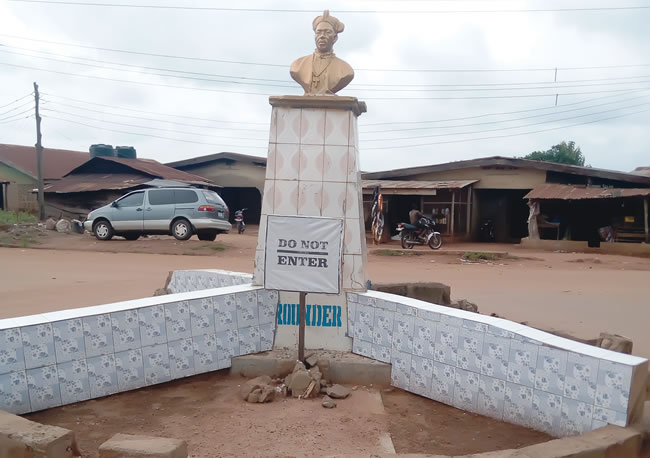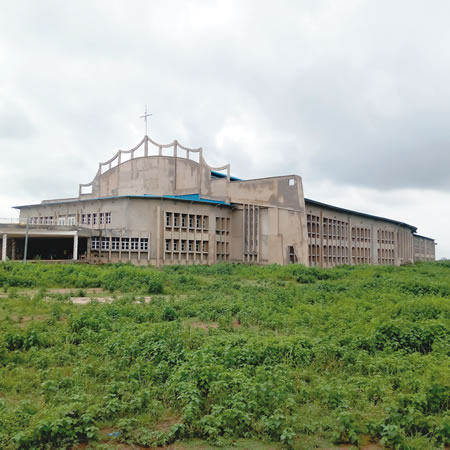In this report, Imoleayo Oyedeyi captures the untold pains that the absence of fuel and epilepsy of electricity supply has caused the community that host the world headquarters of Celestial Church of Christ since 2019.
“Alake Iyafo, an indigene of Imeko in Ogun State, was a trader. Over a century ago, this woman used to travel to Idase in Dahomey (now Benin Republic) to trade, after which she would return to her base in the Ogun community which was very close to the border between Nigeria and the French-speaking country. In one of her trade adventures, Iyafo met a man called Joseph Oshoffa (Oju ki s’ofa) who though was an indigene of Owu land in Abeokuta, was forcefully taken to the French country during the period of war.
“They became lovers and eventually married having settled in Porto Novo, the capital of the French colony of Dahomey. But their marriage was largely fruitless as every child they had died prematurely.”
“Having lost close to eleven children to ill-fated untimely deaths, Iyafo took in again. But instead of bringing joy, the arrival of their new baby gave them sorrow and fear. It was the agonizing experience of the past that made the Oshoffas to name the baby ‘Bi ile aye wun e ko duro’ (If the world interests you, wait, and if not, go like others) His name was shortened to Bilewunmi which the French people called ‘Bilehou’. But Oshoffa survived. And his birth has since then remained a mystery.”
This was how a prince and an elder brother to the King of Imeko, Ibrahim Oyekan of the royal family of Akanku in Imeko, Ogun State narrated how the founder of Celestial Church of Christ, Reverend Samuel Bilehou Joseph Oshoffa came to the world.
Being the son of a carpenter, Oshoffa had gone to the Agonge forest in Republic of Benin in search of an ebony wood but on the afternoon of 23rd May, 1947 which witnessed the eclipse of the sun, the CCC founder was taken on a trance which lasted for three months during which the white garment church was berthed.
According to reports, Oshoffa came out of the forest as a transformed man and his missionary journey took off immediately. He was moving from one state to the other in the French country and pulling huge crowds of people. When the French government couldn’t condone his apparent renown as they saw he was obviously becoming a threat, they sent him out of their country. And this led him to Makoko in Lagos very close to Idofin where he first landed after being ejected. He settled in Makoko and planted the first celestial church in Nigeria in 1951.
Being a Nigerian unknown to many people, Papa Oshoffa as he was fondly called had always hoped to plant a church in Imeko in his mother’s hometown. According to reports, he had seen a vision where he was told that the church headquarter must be situated in the Ogun community. But having newly established the church at Makoko, he decided to exercise some patience before proceeding to his mother’s hometown to see the situation of things.
But unknown to Oshoffa, the Ogun community was a spiritual stronghold for occultists in those days. Oyekan said, “In the olden days before Oshoffa came, it was idol worshippers that dominated Imeko. They were very many. In fact, witches often flew in broad daylight then. It was so terrific those days that one could hardly walk around 7pm without stepping on charms.
“Then, there was one forest where the traditional worshippers used to worship their oracle. It was called ‘Igbo Ifa”. Though it still retains its name, the place was an enclave for occultists then. It was a very powerful place that time to the extent that if the traditional priest wanted to consult the oracle for anyone, they would have to bring him or her to the shrine. But as God would have it, it is on top of this shrine that the first Celestial parish in Imeko sits now,” Oyekan recounted.
He said, “Having planted the church in Makoko, Papa came for a harvest at another celestial church, CCC Agege Parish 1 located in Ogba, Lagos. My family and I were living very close to the parish that time. In fact, from our compound, you can enter the church directly. Fortunately, my sister had given birth and the naming was to take place on Wednesday during the church harvest week. As it was his custom, Papa always held three-day revival during every church harvest week those days. He would have been in the church premises seven days to their harvest day because of the revival and other preparations. This incident happened in December, 1981.
“As expected, the church commenced the revival and on the third day which was also our own naming ceremony, the programme held. And as they were doing it while we were also doing our own child naming, we heard Papa telling the church members to leave our place and come inside the church because a bad incident would happen where we were doing the naming. The members obeyed and not quite long, there was an electric explosion. Unknown to us, one of the electric cables had cut and struck a socket.
“We ran helter-skelter and some of our people ran inside the church. One of them was my elder sister who our royal family in Imeko sent down to represent the family at the naming. The woman was crying and shouting ‘Imeko’. When Papa heard this, he beckoned on the woman and engaged her in lengthy conversations during which he discovered that the woman had hailed from his own mother’s house in Imeko. In fact, unknown to all of us; the husband of that my sister was a younger brother to Papa. It was through the woman that Papa Oshoffa later came back to Imeko for the first time.”
“Though the people welcomed Papa into the community when he first came, it wasn’t an easy ride at all. After all kinds of prayers and work, he told the people that he wished to have a celestial church in the community which they all agreed to. That was how the first church started at his sister’s parlour. Along the line, Papa Oshoffa remembered that his mother had a land around the Ifa forest which was nearby. The people cleared the land and planted the first altar in 1976 on the same shrine housed by the oracle years before he came.
“Meanwhile, having been told in a vision that the CCC world headquarters would be in the Ogun community, Papa Oshoffa asked the people for a large expanse of land. The residents then gave him many hectares. On part of it, Papa built his first house. He even asked the people to dig his burial ground which they did because he said he didn’t know when death would come. He used part of the land to lay the foundation of the church basilica in 1984. He had hoped to commence the structure, but unfortunately, he passed on a year after in 1985,” Oyekan explained.
Imeko, a land battling lack of fuel, electricity supply with pains
It could be recalled that the federal government had on November 6, 2019 directed that no petroleum products should be sold in any filling station within 20 kilometres to the country’s land borders. With an area of 923,768 sq.km, Nigeria is bordered by Benin, Cameroon, Chad, and Niger republics, and also shares maritime borders with Equatorial Guinea, Ghana and São Tomé and Príncipe.
Almost all the countries that share land borders rely on Nigeria’s subsidized petroleum products for their domestic consumption with black marketers making a lot of money from deals. Findings has shown that the border closure has so far paved way for fuel racketeers and smugglers to make fortune by selling the products at exorbitant prices for Nigerians living at the edge of the borders and much higher in the neighbouring countries.
Imeko is part of these land border communities and its residents since then have witnessed a flurry of pains amid total blackout owing to complete breakdown in the supply of electricity to the area.
With the ban of fuel supply, the women leader in the community, Chief (Mrs) Afusat Iyawunmi Olorode said hardship had become deepened in the land as majority of the residents are daily income earners who make their livelihood through motorcycling and trading.
“On fuel, it has not been for us at all. Since the banning of fuel supply to border communities which included ours, we have suffered severely. Those of our sons that are in the bike-riding business of vehicular transportation, it has been agonizing for them because they often have to travel as far as Obada which is over seven kilometres to our place before they can get fuel. At times, they go to Olodo which is close to Ayetoro.
“The problem is so distressing that even our market women that are engaged in petty trading often find it very difficult to transport their goods from the farm to the market for sale. And if they eventually get a vehicle or bike to convey their produces, they pay exorbitant fares to the drivers. A short distance within the community will cost you nothing less than one hundred and fifty naira. But can you blame the motorcyclists or drivers? So it’s a big problem for us because it has frustrated our businesses and means of survival,” she added.
The women leader explained that as rain has sets in now, the situation has worsened. “You know during the raining period, the roads will be bad because of its impassable nature. It has made it very hard for our women to visit their farms to bring their produce for trading. They trade in vegetables, pepper, corn and the likes, but the bad nature of the road coupled with the ban of fuel supply which increased transport fares has made life very painful for our people. We are appealing to our governments to assist us,” she said.
She stressed that, though the king of the town, Olanite has made several appeals to the government concerning the numerous lacks causing the people untold anguish with nothing done so far, the community will keep appealing to the Ogun State government and Federal Government to reconsider its ban of fuel supply to bordering communities because, to her, it wasn’t the fault of the people to found themselves in the towns.
When Saturday Tribune got to the community on Monday, it was apparent that the people had been battling epileptic power supply as there were several commercial phone charging points situated in different part of the Ogun community.
Lending credence to this in an interview with Saturday Tribune, the Asoju of the community, Chief Rasheed Fola Olaleye said that the last time enjoyed consistent power was during the time of a former governor of the state, Olusegun Osoba. “The effect of ban of fuel supply has been worsened by erratic power supply from the Distribution Company. Presently, we have electricity just once a week. And that too has not been consistent. That is why everywhere is mostly dark at night. There is no light and the fuel that the people use to power their generators has become very expensive. Not many people could afford the exorbitant price a litre is being sold for. It costs three hundred naira per litre if you even see a place to buy.”
“We can only appeal because as you know energy is key to the survival of businesses. Any environment where there is shortage of energy supply, there is little to what the people can achieve in business terms. And when they add the cost they incur on fuel to the goods, it becomes very expensive for the people to buy. That is what we are facing here. We pray that the ugly tide changes soon,” he added.
Speaking with Saturday Tribune, the king of Imeko land, Oba Benjamin Alabi Olanite said the coming of celestial church to his town has been remarkable but he would really appreciate if the church management can put in the same level of recent seriousness directed towards the completion of the basilica project to the university project for which the community gave land to the church three years ago.
“The coming of Celestial Church to our town has been remarkable because we have seen their impacts so far. Besides, each time they have programmes like annual convocation and quarterly annointment exercises, our town is always busy. There would be huge activities and our people will make better sales. But just like they have done to the basilica project, I would want the church management to take the University project seriously. We have given them lands as they demanded but we won’t want the project to linger for years like the basilica building,” Olanite, the Akanku IV said.
And on the agony which his people are going through due to lack of fuel and electricity supply, the king further appealed to the Distribution Company to look into their plights and address the erraticism of electricity to the area in a bid to lessen the pains the ban of fuel is causing the people daily just as he called on the Federal government to reconsider its decisions relating to border communities in the country.
YOU SHOULD NOT MISS THESE HEADLINES FROM NIGERIAN TRIBUNE







